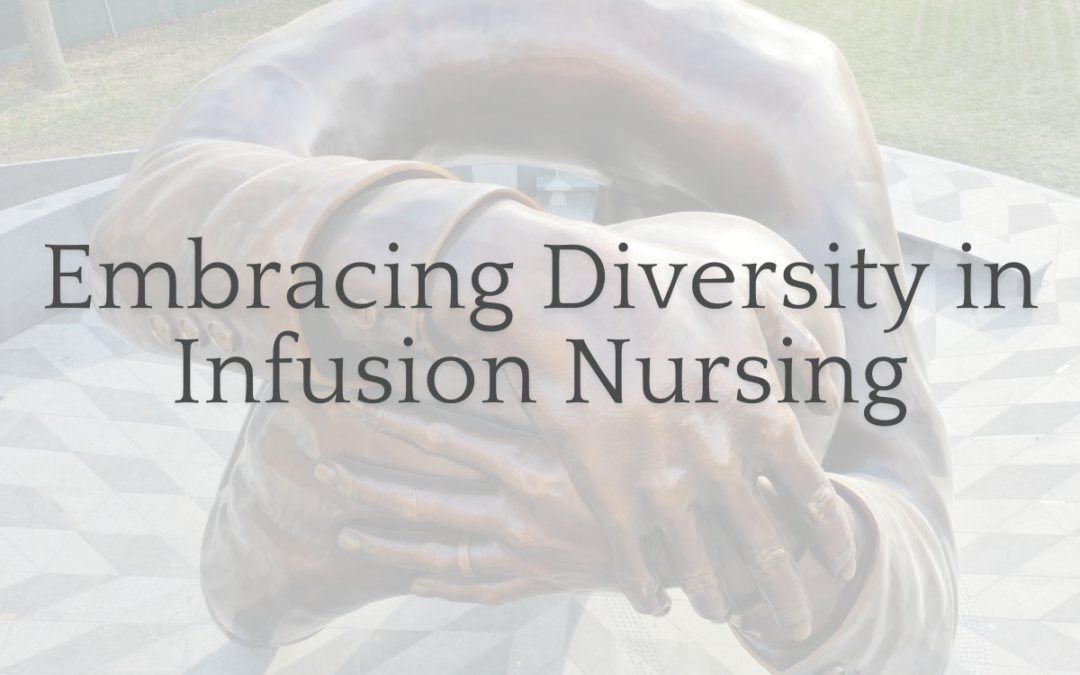By: Danielle Jenkins, MBA, BSN, RN, CRNI®
President, INS Board of Directors
As I craft the ideas of this article, I remember standing under “The Embrace” statue located in Boston, Massachusetts. The artwork is a permanent monument representing the Rev. Dr. Martin Luther King Jr. and Coretta Scott King’s love and powerful presence in Boston, a time that helped shape their approach to an equitable society. I’m reminded just how important it is to contribute to equitable health care. By using our voices to make changes within our own organizations to embrace the INS Standards, we must look for ways to improve policies related to infusion nursing and equitable care.
Diversity in health care is crucial because it offers multiple patient benefits and can enhance both patient care quality and financial outcomes for organizations. These benefits include a reduction in care disparities, improved and optimized care delivery, and improved access to care. As the racial and ethnic demographics of the country grow more diverse, it will become increasingly crucial for nurse leaders to recognize, respect, and embrace diversity in their care delivery approach.
As I reflect on stories of many diverse patients, I’m reminded just how important it is that we stay abreast of changes within the communities we serve. As nurses, we have an obligation to understand the complexity of patients and understand their viewpoints. By using our expertise to contribute to research, we can help identify the issues that overlap into infusion nursing, such as that of peripheral intravenous catheter (PIVC) insertion failed attempt rates, which are elevated among people of color, as we learned at the 2024 INS conference. Individuals with different ethnicities may have different skin colors, and PIVC insertion might be difficult in certain individuals of particular skin color.
Dr. King Jr. said it best when he stated, “Of all the forms of inequality, injustice in health care is the most shocking and inhumane.” We have much to do to truly ensure that diversity and inclusion in health care is the norm and not the exception.

As Infusion Nurses, we have an opportunity to bring awareness to our industry and impact change by listening intently to our patients’ viewpoints, assessing our current policies and procedures and training materials, and taking action to improve overall health care delivery. It’s a matter of impacting what you can as a “one bite at a time” approach. Infusion Nurses are all leaders, even without the official title. By reading this article, you are demonstrating your passion for the field and your willingness to learn and grow. I’m thrilled to be working among the best nurses in the world!
I’m honored to be an infusion nurse and embrace all aspects of the field. As our landscape continues to change, let us evolve and make it better for everyone.
BIBLIOGRAPHY
Gomez LE, Bernet P. Diversity improves performance and outcomes. J Natl Med Assoc. 2019;111(4):383-392. doi: 10.1016/j.jnma.2019.01.006.
Eren, H. Intech Open. Difficult Intravenous Access and Its Management. Ultimate Guide to Outpatient Care. Zaman GS, ed. March 19, 2021. Accessed June 19, 2024. https://www.intechopen.com/chapters/75477






